We may not have the course you’re looking for. If you enquire or give us a call on 0800 446148 and speak to our training experts, we may still be able to help with your training requirements.
We ensure quality, budget-alignment, and timely delivery by our expert instructors.
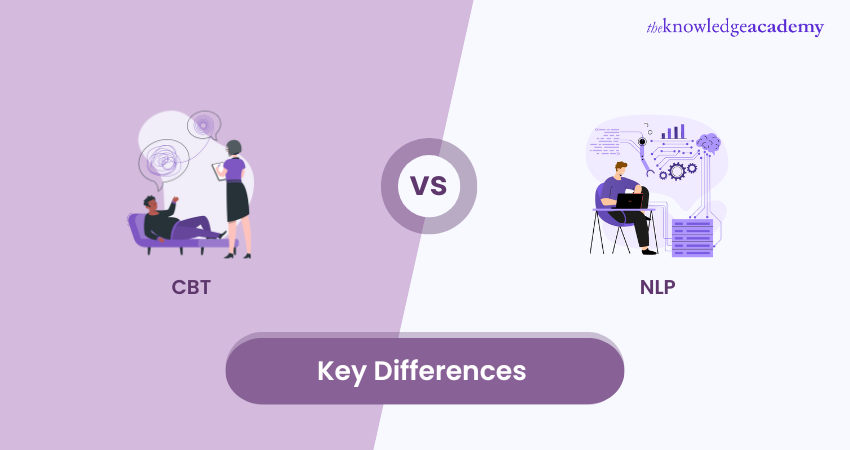
Have you ever found yourself pondering the choice between NLP vs CBT? It's a decision that can shape your journey toward personal growth and mental well-being. Each offers unique strategies to transform how we think, communicate, and interact with the world around us. But which one truly resonates with your goals?
As we explore NLP vs CBT, we'll unravel the key differences that set them apart. From theory to effectiveness, understanding these approaches helps you choose the right path for personal growth or therapy. Are you ready to dive into this fascinating exploration? Let’s uncover the secrets behind these powerful approaches and see which one holds the key to unlocking your full potential!
Table of Contents
1) What is NLP?
2) What is CBT?
3) NLP or CBT: Key Differences
a) Theoretical Foundations
b) Focus of Change
c) Application Scope
d) Research Support
e) Effectiveness and Suitability
4) Conclusion
What is NLP?
Neuro-Linguistic Programming (NLP) is a psychological procedure that studies how the mind, language, and behaviour interact to shape an individual’s experience. By understanding these connections, NLP offers tools and techniques to help individuals improve communication, develop positive habits, and achieve personal goals.
It is often used in therapy, coaching, and personal development to enhance self-awareness and interpersonal skills. NLP aims to reframe negative thought patterns, enabling more effective communication and behaviour change, leading to personal growth and improved well-being.
Pros of NLP
Neuro-Linguistic Programming offers several benefits that can significantly enhance personal and professional development. Some of the key advantages include:
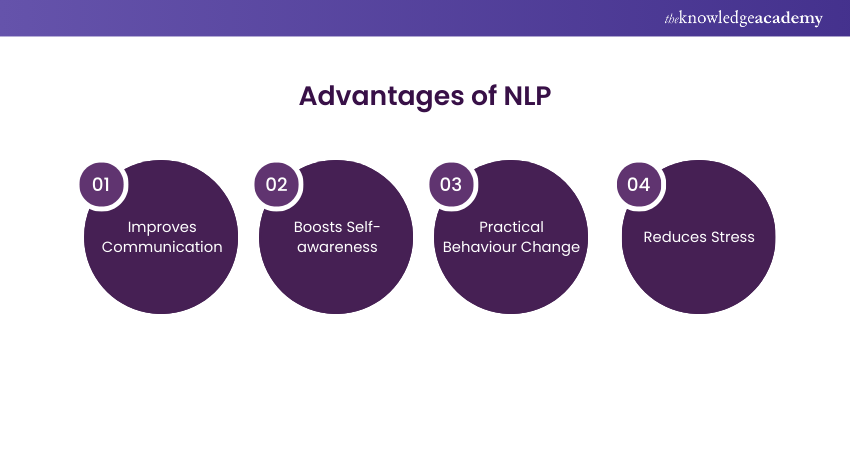
a) Enhances communication skills
b) Promotes self-awareness and personal growth
c) Offers practical techniques for behaviour change
d) Can improve emotional well-being and reduce stress
Ready to Shine in Your Next Interview? Start Practicing with Top NLP Interview Questions!
Cons of NLP
Despite its potential benefits, NLP also has some drawbacks and limitations that are important to consider. These include:
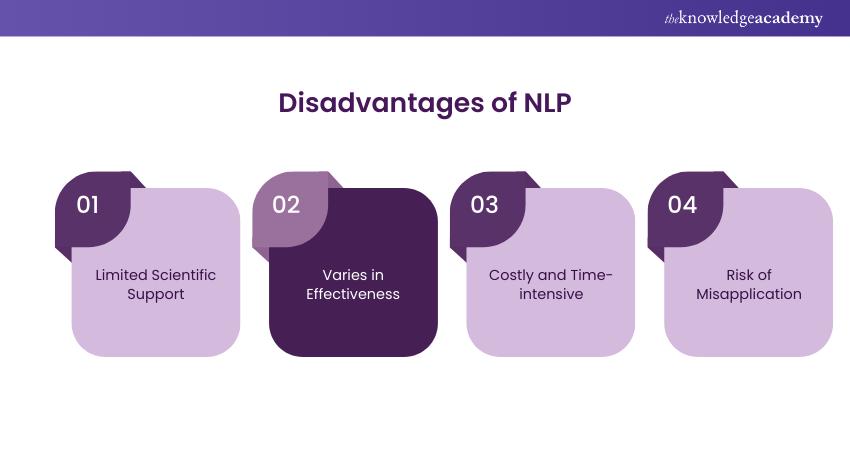
a) Lacks strong scientific evidence and is sometimes viewed as pseudoscience
b) Effectiveness may vary significantly between individuals
c) Learning may be costly and time-consuming
d) Misapplication of techniques may lead to ineffective outcomes
What is CBT?
Cognitive Behavioural Therapy (CBT) is a structured, time-limited psychological treatment emphasises on recognising and altering negative thought patterns and behaviours. CBT is based on the idea that our thoughts, feelings, and behaviours are interconnected. By altering distorted thinking, we can change the way we feel and act.
It is commonly used to treat a variety of psychological problems, including anxiety, depression, and phobias. CBT involves practical, goal-oriented techniques that help individuals challenge and replace negative thoughts, ultimately leading to healthier emotional responses and behaviours.
Pros of CBT
Cognitive Behavioural Therapy is well-known for its effectiveness and structured approach. Here are some of the key benefits:
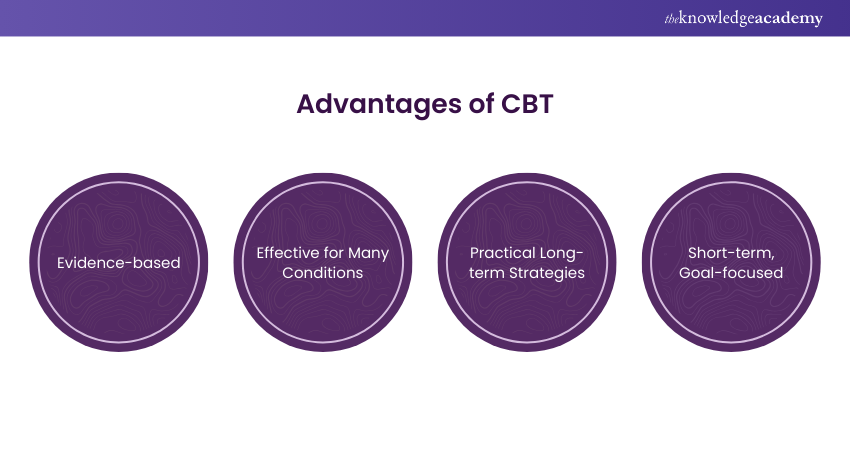
a) Evidence-based and widely supported by research
b) Beneficial for many kinds of mental health issues
c) Provides practical coping strategies that can be used long-term
d) Typically, short-term and focused on specific goals
Enhance your skills with our Develop Cognitive Behavioural Therapy Training – Join now!
Cons of CBT
While CBT offers numerous advantages, it also comes with certain challenges and limitations. These include:
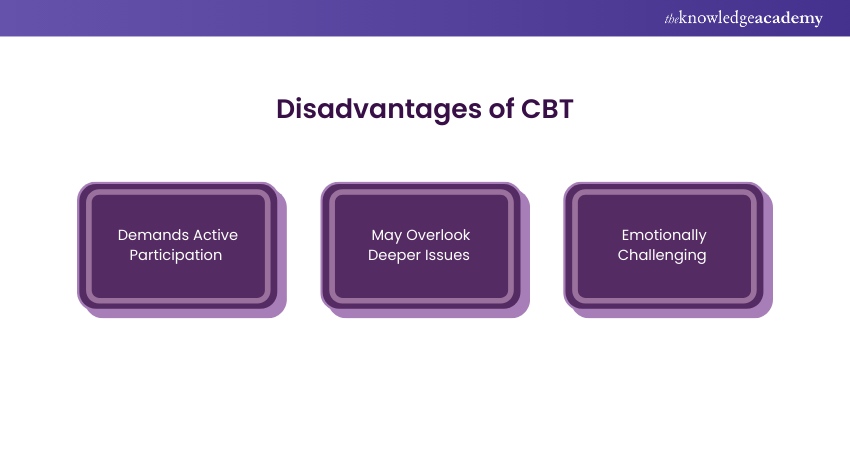
a) Demands the person's commitment and active participation
b) May not address deeper, underlying issues beyond thoughts and behaviours
c) It can be challenging and emotionally intense
d) It may not be effective for everyone, especially in severe or complex cases
NLP or CBT: Key Differences
Now that we know what CBT and NLP are, we will now dive deeper into a comparison of CBT vs NLP. This blog section will expand on the key differences between CBT vs NLP to help you make a choice between the approaches.
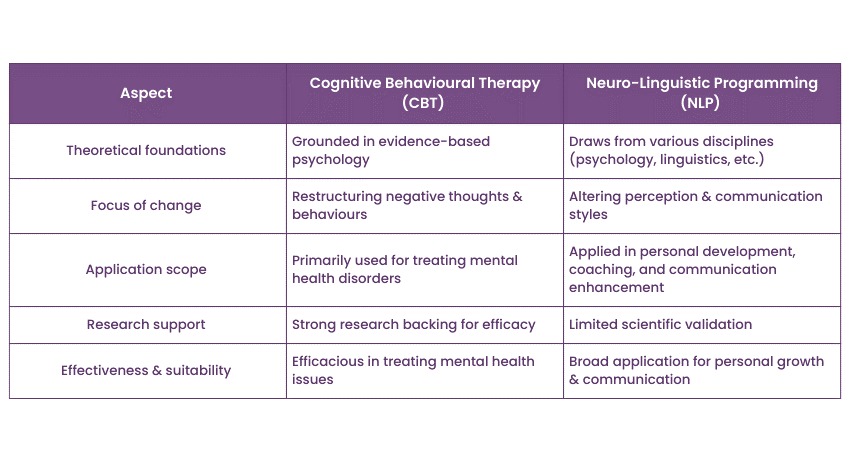
Theoretical Foundations
CBT is rooted in well-established psychological theories, including cognitive theory and behavioural conditioning. CBT therapists analyse how negative thought patterns contribute to emotional distress and problematic behaviours. They then work on challenging and restructuring these thoughts to promote healthier emotions and actions.
On the other hand, NLP lacks a cohesive theoretical foundation and draws from various disciplines, incorporating concepts from psychology, linguistics, and cybernetics. However, NLP Meta Programs and NLP calibration can offer useful insights into individual behaviour patterns.
Focus of Change
CBT primarily concentrates on modifying negative thought patterns and behaviours that contribute to emotional and mental health issues. Therapists help clients identify cognitive distortions and provide practical strategies to challenge and replace them with more rational thoughts.
In contrast, NLP focuses on altering perception and communication styles to achieve personal goals and enhance interpersonal effectiveness. It emphasises understanding subjective experiences and reframing them to improve outcomes and self-awareness.
Application Scope
CBT is primarily used as a clinical intervention for several mental health disorders, such as anxiety, depression, and phobias. It is based on evidence-backed techniques and has been extensively studied and validated in clinical settings. On the other hand, NLP finds applications in personal development, coaching, sales, and communication training. It is frequently used in non-clinical contexts to enhance performance, build rapport, and improve leadership skills.
Research Support
One significant difference between CBT and NLP lies in the amount of research support. CBT has garnered substantial empirical evidence supporting its effectiveness in treating various mental health conditions. Its evidence-based approach makes it a widely accepted and recommended treatment option by mental health professionals.
In contrast, NLP's scientific validation is limited, with fewer controlled studies supporting its claims. While some individuals report positive outcomes, more research is needed to establish its efficacy on a broader scale. NLP for Dummies can provide a starting point for understanding the basics.
Effectiveness and Suitability
Due to its strong scientific foundation, CBT is considered highly effective for individuals dealing with diagnosed mental health disorders. It offers structured and targeted interventions that can bring about meaningful and lasting changes in thought and behaviour patterns.
Conversely, NLP is often seen as a complementary approach to personal development and self-improvement. It may be more suitable for individuals seeking to enhance their Communication Skills, develop confidence, and achieve specific goals outside the realm of clinical mental health issues.
Take control of your mind and transform your life with NLP by joining our Neuro-Linguistic Programming Courses today!
Conclusion
Both CBT and NLP offer valuable insights and techniques to promote personal development and well-being. Ultimately, the choice between CBT or NLP will depend on individual needs and preferences, and some individuals may even benefit from integrating aspects of both approaches into their journey of self-improvement. Hope we have provided you with the detailed comparison of NLP vs CBT that you were looking for!
Unlock your potential and master the art of NLP. – Register for our NLP Training today!
Frequently Asked Questions
How do NLP Strategies Empower Effective Leadership and Team Dynamics?

NLP strategies empower effective leadership and team dynamics by enhancing communication and fostering empathy. They also improve problem-solving skills, enabling leaders to inspire, motivate, and build cohesive, high-performing teams.
How can NLP Techniques be Applied in Business Communication to Improve Negotiation Skills and Client Relationships?

NLP techniques improve business communication by enhancing negotiation skills and client relationships. They enable a better understanding of communication styles, build rapport, and foster trust, leading to more effective negotiations and stronger, more empathetic client interactions.
What are the Other Resources and Offers Provided by The Knowledge Academy?

The Knowledge Academy takes global learning to new heights, offering over 3,000 online courses across 490+ locations in 190+ countries. This expansive reach ensures accessibility and convenience for learners worldwide.
Alongside our diverse Online Course Catalogue, encompassing 19 major categories, we go the extra mile by providing a plethora of free educational Online Resources like News updates, Blogs, videos, webinars, and interview questions. Tailoring learning experiences further, professionals can maximise value with customisable Course Bundles of TKA.
What is The Knowledge Pass, and How Does it Work?

The Knowledge Academy’s Knowledge Pass, a prepaid voucher, adds another layer of flexibility, allowing course bookings over a 12-month period. Join us on a journey where education knows no bounds.
What are the Related Courses and Blogs Provided by The Knowledge Academy?

The Knowledge Academy offers various NLP Training, including NLP Foundation And Practitioner Training, Introduction To NLP Course, Master Diploma In NLP and Neuro Linguistic Programming. These courses cater to different skill levels, providing comprehensive insights into NLP for Insomnia.
Our Business Skills Blogs cover a range of topics related to Neuro-Linguistic Programming, offering valuable resources, best practices, and industry insights. Whether you are a beginner or looking to advance your Business skills, The Knowledge Academy's diverse courses and informative blogs have got you covered.
Upcoming Business Skills Resources Batches & Dates
Date
 Neuro Linguistic Programming
Neuro Linguistic Programming
Fri 11th Apr 2025
Fri 18th Jul 2025
Fri 21st Nov 2025






 Top Rated Course
Top Rated Course



 If you wish to make any changes to your course, please
If you wish to make any changes to your course, please


